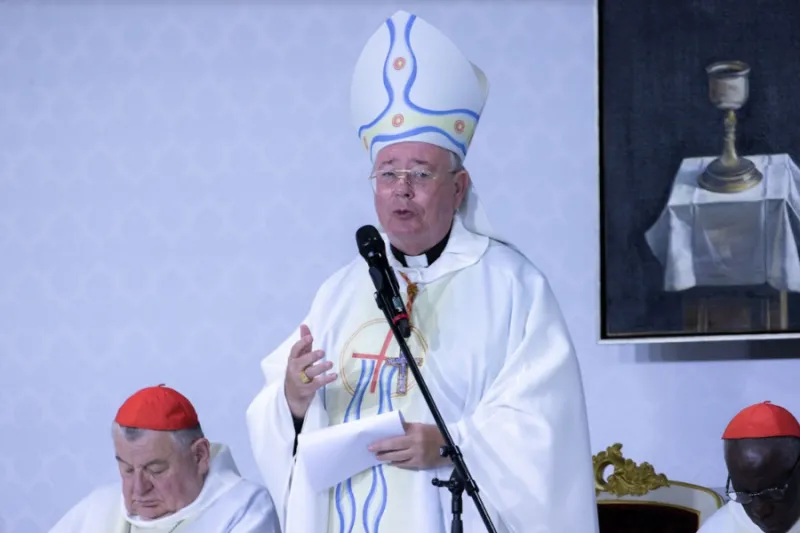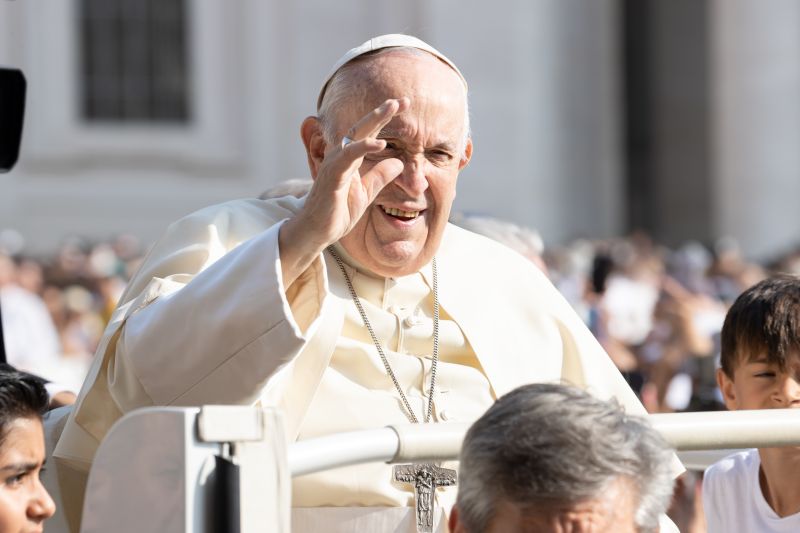
Freiburg, Jan 27, 2022 / 10:20 am (CNA).
A Jesuit cardinal who will play a central role in the 2023 Synod on Synodality has said that reforms in the Catholic Church require “a stable foundation.”
In a wide-ranging interview in the February edition of the German magazine Herder Korrespondenz, Cardinal Jean-Claude Hollerich was asked whether he could envisage the introduction of women deacons, reported CNA Deutsch, CNA’s German-language news partner.
He said: “I would have nothing against it. But reforms need a stable foundation. If the pope were now simply to allow viri probati [the priestly ordination of mature, married men] and deaconesses, the danger of schism would be great.”
“After all, it’s not just about the German situation, where perhaps only a small part would break away. In Africa or in countries like France, many bishops would possibly not go along with it.”
Last July, Pope Francis named Hollerich, the archbishop of Luxembourg, as the relator general of the 16th Ordinary General Assembly of the Synod of Bishops in Rome.
The event, commonly known as the Synod on Synodality, has been described as the most important Church event since the Second Vatican Council in 1962-65.
Hollerich told Herder Korrespondenz he believed that Pope Francis was misunderstood.
He said: “The pope has nothing against conservatives if they learn from life. In the same way, he has nothing against the reformers if they keep the whole Church in mind. And the pope does not like infighting in the Church.”
“I sometimes have the impression that the German bishops do not understand the pope. The pope is not liberal, he is radical. From the radicality of the Gospel comes the change.”
The cardinal, who is also the president of the Commission of the Bishops’ Conferences of the European Union (COMECE), acknowledged that structural reform was necessary, but said it required consensus.
“In any case, we have to take as many people as possible along the way,” he said. “And then it’s not about pastoral workers becoming second-class clergy. There must not be an ordained and a non-ordained clergy, but clericalism must be destroyed. Among the priests, but also among the laity.”
The 63-year-old cardinal also discussed the Latin Mass, which he said had a “very beautiful” text. He explained that he sometimes used Latin when celebrating Mass in his private chapel, but had reservations about doing so in a parish setting.
“I know the people there don’t understand Latin and can’t do anything with it,” he said.
“But I have been asked to do a Latin service in Antwerp [Belgium], in the present rite. I will do that, but I would not celebrate in the old rite.”
Hollerich noted that as a cardinal, he would be expected to wear a cappa magna (“great cape”), a vestment with a long train.
“I would certainly fall because I am not used to walking with such a train,” he said.
“And above all, I would be mortally embarrassed. What would Christ say? Is that how you imagine me following Him? To glide along wrapped in purple? ‘I have said that he who loves me must take up his cross… and follow me, not take up your purple train.’”
“I would have the impression that I was betraying Christ. That is not to say that other people may not be able to do it in a good sense. But I can’t.”
If you value the news and views Catholic World Report provides, please consider donating to support our efforts. Your contribution will help us continue to make CWR available to all readers worldwide for free, without a subscription. Thank you for your generosity!
Click here for more information on donating to CWR. Click here to sign up for our newsletter.






PULEEZ confirm Jimmy Kimmel in a different mode. PULEEZ notify of Internet Platform Malware Warp.
His eminence speaketh of a “stable foundation”, but then offers a mess of pottage. As a truly stable foundation, what of Tradition as reaffirmed in Ordinatio Sacerdotalis? https://www.vatican.va/content/john-paul-ii/en/apost_letters/1994/documents/hf_jp-ii_apl_19940522_ordinatio-sacerdotalis.html
Prior to the Amazonian synod, Hollerich sputtered the same inconclusive indifference, after which the Holy Father reaffirmed that the issue was a settle matter. But, now this all over again…
It’s probably true that the pope has nothing against so-called conservatives, although within the Eucharistic Church, the nomenclature of conservative and liberal, itself, is nonsense. (And so long the “rigid bigots” are separated out, by papal speech writers, for special verbal abuse as a mutant species.)
Then Hollerich cautions us: “If the pope were now simply to allow viri probati [the priestly ordination of mature, married men] and deaconesses, the danger of schism would be great.” Indeed, from the so-called “liberal” side, the schism would already be in place!
And why is the conjectural ordination of “married men” (a disciplinary matter, but also with weighty substance) and of “deaconesses” (an invalid doctrinal violation) conflated as equivalent propositions? Is a captive audience being groomed with code language, perhaps, or is it simply functional illiteracy?